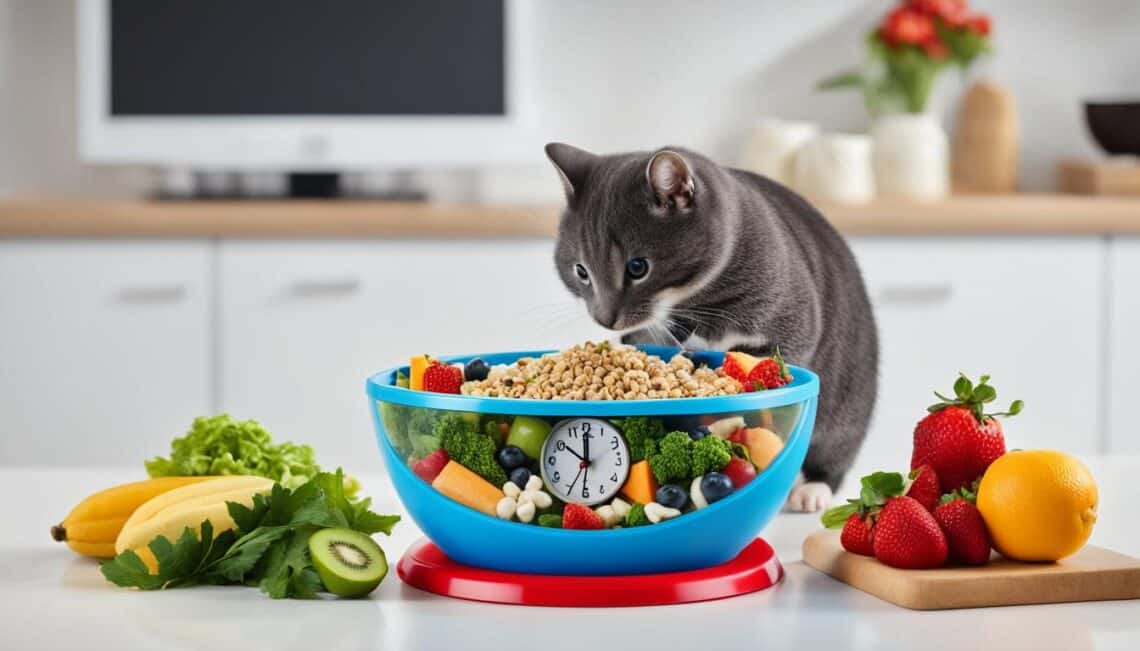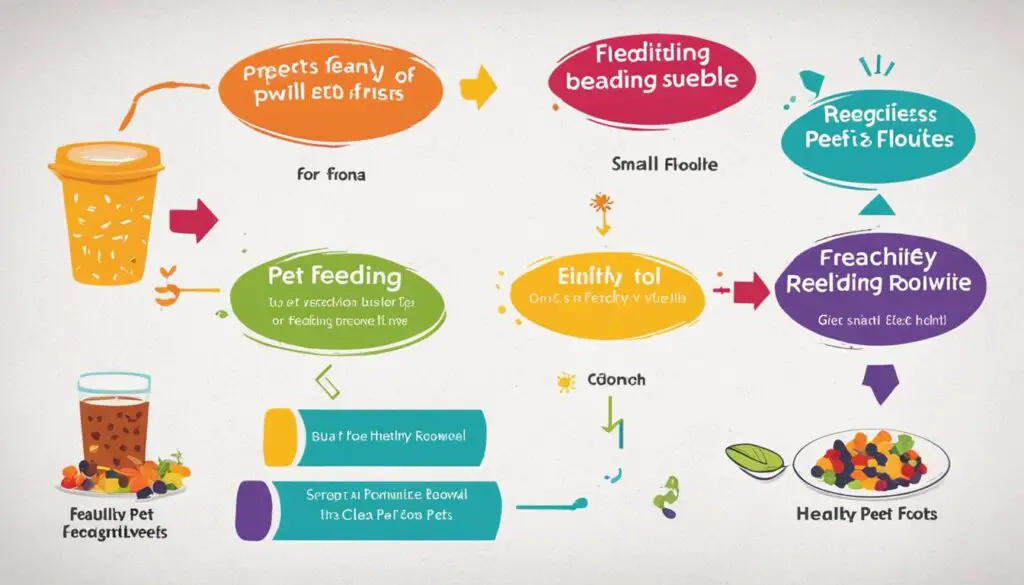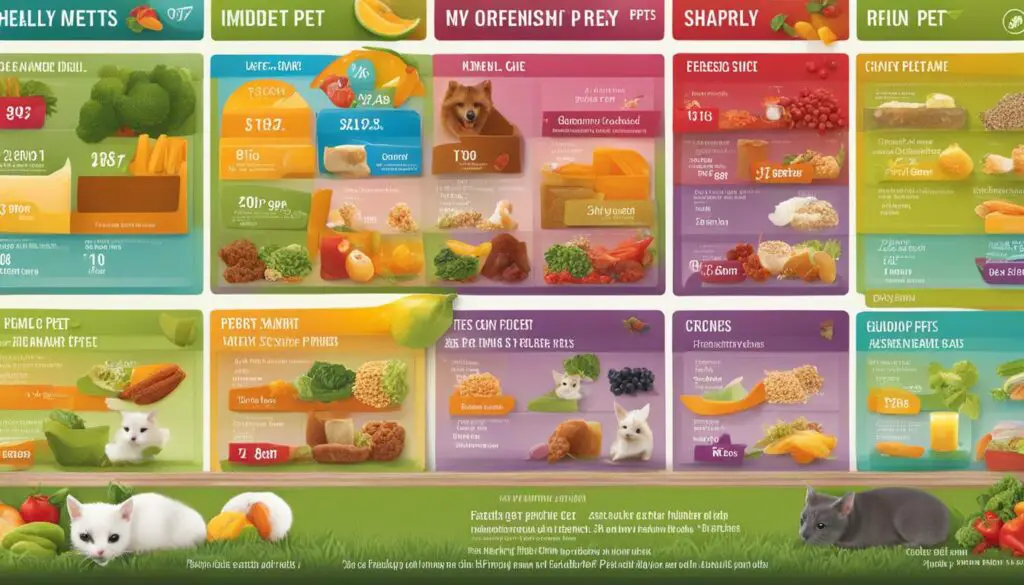Creating a feeding schedule for your pet is essential for their overall health and well-being. A proper feeding schedule helps maintain their digestive health, weight, and energy levels, ensuring they receive the necessary nutrition they need. Whether you have a dog or a cat, establishing a regular feeding routine is key to promoting their well-being.
Proper nutrition plays a vital role in keeping small pets healthy. A well-balanced diet enhances their immune system, supports their growth and development, and improves their overall quality of life. By developing a feeding schedule, you can ensure that your furry friend receives the appropriate nutrients at the right times, preventing any nutritional deficiencies or imbalances that may adversely affect their health.
Key Takeaways:
- A feeding schedule is crucial for the health and well-being of small pets.
- Establishing a routine helps maintain their digestive health, weight, and energy levels.
- Proper nutrition plays a significant role in keeping small pets healthy.
- Creating a feeding schedule ensures they receive the necessary nutrients at the right times.
- Avoid nutritional deficiencies or imbalances by providing a well-balanced diet.
Feeding Schedule for Dogs
When it comes to feeding your dog, establishing a consistent and well-planned feeding schedule is of utmost importance. By following a structured routine, you can ensure that your furry friend receives the necessary nutrition and maintains a healthy weight. Here’s a guide on how to create a feeding schedule for your dog:
- Feed your dog twice a day, with puppies under five months requiring three feedings.
- Space the meals approximately 8 to 12 hours apart, maintaining one in the morning and one in the evening.
- Choose a consistent time and location to feed your dog to establish a routine. Avoid feeding them near the dining table or where you prepare food to prevent begging and the intake of inappropriate food.
- Once your dog finishes eating, pick up the food dish to prevent grazing or scavenging behavior.
- Provide a consistent amount of food during each feeding, tailored to your dog’s size, age, and activity level.
- Factor in treats as part of your dog’s overall diet, but adjust the quantity of regular food to maintain a balanced intake.
By adhering to a structured feeding schedule, you can ensure that your dog’s mealtimes are consistent, promoting good digestion and a healthy lifestyle. Remember, maintaining a routine is key to your dog’s well-being!
Feeding your dog at consistent times and in the same location can help establish a routine.
| Meal Times | Location | Amount | |
|---|---|---|---|
| Morning | 8 AM | Kitchen | 1 cup |
| Evening | 6 PM | Kitchen | 1 cup |
Feeding Schedule for Cats
Cats, like dogs, benefit from having a consistent feeding schedule. By establishing a regular routine, you can provide structure and security to your feline friend. Unlike dogs, however, it is not recommended to keep their food bowl filled and allow grazing throughout the day. Instead, cats should be fed at least twice a day, with meals spaced approximately 12 hours apart.
To ensure your cat receives the appropriate amount of food, measure out their entire day’s portion and offer it at specific times. This approach allows you to monitor their intake and prevents overeating, which can lead to weight gain and health issues. By offering scheduled meals, you also create an opportunity for mental stimulation and engagement during feeding times.
Benefits of a Feeding Schedule for Cats:
- Promotes a healthy weight and prevents obesity
- Prevents digestive problems by allowing for proper digestion and absorption of nutrients
- Reduces the risk of behavioral issues such as aggression and anxiety
- Facilitates monitoring of your cat’s appetite and overall health
“Implementing a feeding schedule ensures that your cat receives consistent nutrition and maintains a healthy lifestyle.” – Dr. Emily Williams, DVM
It’s important to consult with your veterinarian to determine the appropriate type of food, quantity, and frequency of feeding for your cat. Additionally, consider using interactive food toys to provide mental stimulation during meals, promoting physical and mental well-being.
A feeding schedule not only helps maintain your cat’s health but also strengthens the bond between you and your feline companion. By providing regular meals and establishing a routine, you can enhance their overall quality of life and ensure they receive the nourishment they need.
Benefits of a Feeding Schedule
Establishing a feeding schedule for your small pet has numerous benefits. It helps to improve their digestive health, as regular meal times allow for proper digestion and nutrient absorption. Additionally, a feeding routine aids in weight management, preventing overeating and excessive weight gain. This is especially important for small pets, as obesity can lead to various health issues. By adhering to a feeding schedule, you can ensure that your pet maintains a healthy weight.
“A consistent feeding schedule can greatly contribute to your pet’s overall well-being. It provides stability and security, which is especially beneficial during times of change or stress.”
In addition to digestive health and weight management, a feeding schedule establishes a routine for your pet. Animals thrive on consistency and predictability, and having set meal times helps them feel secure and in control. This routine can also assist in behavioral training, as it sets clear expectations and boundaries for your pet’s mealtime behavior.
By following a feeding schedule, you can also monitor your pet’s appetite and detect any changes in their eating habits. Sudden changes in appetite could be an indicator of an underlying health issue. Regularly observing your pet’s feeding routine allows you to identify any potential concerns and consult with a veterinarian if necessary.
The Role of Routine in Pet Well-being
Routine plays a crucial role in maintaining a pet’s overall well-being. It provides structure and stability, reducing stress and anxiety. Pets thrive on consistency, and having a consistent feeding schedule helps regulate their biological functions, such as digestion. Additionally, routine helps establish a sense of security and ensures that your pet’s needs are consistently met.
Implementing a feeding schedule for your small pet is a proactive approach to their health and happiness. It not only improves their digestive health and weight management but also provides the routine and stability they need. By adhering to a feeding schedule, you can ensure the well-being of your furry friend.
Creating and Maintaining a Feeding Schedule
When it comes to your small pet’s nutrition, creating and maintaining a feeding schedule is crucial for their overall health and well-being. Consistency is key when it comes to feeding your pet, as it helps establish a routine and ensures they receive the proper nutrition they need.
Here are some important steps to follow when creating and maintaining a feeding schedule:
- Choose specific meal times: Set specific times for feeding your pet each day. Consistency in meal times helps regulate their metabolism and energy levels.
- Stick to the schedule: Once you’ve established meal times, be sure to stick to them consistently. This helps your pet anticipate when they will be fed and creates a sense of stability.
- Feed in the same location: Designate a particular area for feeding your pet. This helps create a routine and prevents any confusion about where they should go to eat.
- Avoid feeding near human food areas: It’s important to keep your pet’s feeding area separate from areas where human food is prepared or consumed. This helps prevent them from begging for food or eating inappropriate items.
- Use measured portions: Provide your pet with measured portions of nutritious food tailored to their specific needs. This helps prevent overeating and ensures they receive the right amount of nutrients.
- Factor in treats: If you want to give your pet treats, adjust the quantity of their regular food accordingly. This helps maintain their overall calorie intake and prevents excessive weight gain.
- Seek professional guidance: Regular veterinary check-ups and guidance are essential in maintaining a healthy feeding schedule for your pet. Your veterinarian can provide personalized advice on the type of food, quantity, and frequency of feeding that is best for your pet.
By following these steps and maintaining a consistent feeding schedule, you can help ensure that your small pet receives the proper nutrition they need for a healthy and happy life.
| Benefits of Creating and Maintaining a Feeding Schedule |
|---|
| 1. Promotes healthy digestion |
| 2. Regulates weight management |
| 3. Creates a sense of routine and stability |
| 4. Prevents overeating and excessive weight gain |
| 5. Ensures your pet receives the right amount of nutrients |
Conclusion
Developing a feeding schedule is crucial for the overall health and well-being of your small pet. Whether you have a dog or a cat, establishing a consistent routine and providing nutritious food in measured portions is key to their vitality and happiness.
By sticking to the recommended meal times, you ensure that your pet receives the proper nutrition they need at regular intervals. Avoiding grazing and instead offering measured portions of food helps prevent overeating and excessive weight gain, promoting a healthy weight for your furry companion.
Additionally, it’s important to factor in treats into their feeding schedule by adjusting the quantity of regular food accordingly. This allows them to enjoy special rewards while still maintaining a balanced diet.
For personalized guidance on your pet’s feeding schedule, it is always beneficial to consult with your veterinarian. They can provide expert advice tailored to your pet’s specific needs, ensuring optimal health and well-being for your furry friend.
FAQ
Why is creating a feeding schedule important for small pets?
Creating a feeding schedule for your small pet is crucial for their overall health and well-being. It helps maintain their digestive health, weight, and energy levels.
How often should I feed my dog?
Dogs should be fed twice a day, with meals approximately 8 to 12 hours apart. Puppies under five months old should have three feedings per day.
What is the recommended feeding routine for dogs?
It is important to feed your dog at consistent times and in the same location to establish a routine. Avoid feeding them near the dining table or where you prepare food to prevent begging and the intake of inappropriate food.
How should I handle treats in my dog’s feeding schedule?
Factor treats into your dog’s feeding schedule by reducing the amount of regular food accordingly.
How often should I feed my cat?
Cats should also be fed at least twice a day, with meals about 12 hours apart.
Should I let my cat graze throughout the day?
It is not recommended to keep the bowl filled and allow grazing. Instead, measure out the entire day’s portion of food and offer it at regular times throughout the day.
What benefits does a feeding schedule have for small pets?
Establishing a feeding schedule for your small pet improves their digestive health, aids in weight management, and provides stability and security, especially during times of change or stress.
How can I create and maintain a feeding schedule for my small pet?
Choose specific meal times and stick to them consistently. Feed your pet in the same location to establish a routine and use measured portions of nutritious food tailored to their specific needs. Regular veterinary check-ups and guidance can ensure optimal nutrition and feeding practices for your pet.







No Comments